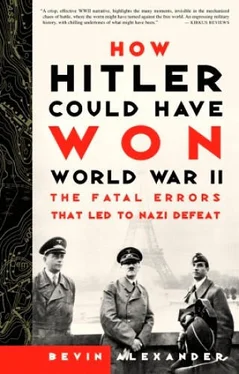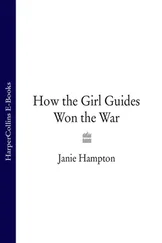This defensive fight broke the British barrier at the Caldron and opened the way for rapid movement. But Rommel decided first to eliminate Bir Hacheim before bursting forward.
On June 8, elements of 15th Panzer joined other Axis forces in a coordinated attack of extreme violence from all directions against the Free French brigade, under the inspired leadership of Pierre Koenig. A German Kampfgruppe finally cracked the main position on June 10, but the greater part of the garrison broke out during the night and was picked up by the 7th British Motor Brigade. This demonstrated how difficult it is to contain a determined force. Only 500 soldiers fell into German hands, most of them wounded.
The way was now open for Rommel to drive into the British vitals, though Ritchie had brought up reinforcements and now had 330 tanks, twice the remaining strength of Africa Corps. But the Germans were smelling victory, while the British had been badly shaken.
On June 11, 1942, 15th Panzer turned northeast toward El Adem, with 90th Light, now down to 1,000 men, on its right, and Trieste Division on the left. By nightfall the force was south and west of El Adem, facing the 2nd and 4th Armored Brigades.
Rommel ordered 21st Panzer to swing around to the northeast the next day and attack the enemy armor in the rear. The British tank units, not realizing they could not remain stationary while the whole Axis army was on the move, was trapped. German AT guns moved forward and began a systematic execution. When 22nd Armored Brigade came down from the north to help, it was too late, caught by 21st Panzer and Trieste, and suffered heavy losses.
The two cornered brigades tried to flee, the 2nd withdrawing in some order with 22nd Brigade toward Knightsbridge box, a few miles north, but the 4th’s retreat turned into a rout, and it lost most of its force, 120 tanks.
The next day Rommel turned north, aiming at the Knightsbridge box. But the British had finally realized that defensive boxes in the open desert were prisons not bastions, and they withdrew, with the panzers harrying the fleeing armor. By nightfall Ritchie had barely 100 tanks left, and Rommel enjoyed tank superiority for the first time. He also was in possession of the battlefield and recovered many tanks.
With the Germans overflowing the rear, the British along the Gazala line were in danger of being cut off and, on Ritchie’s orders, withdrew on the morning of June 14. The same morning Rommel sent Africa Corps past Acroma with urgent orders to seal off the Via Balbia during the night and intercept the fleeing enemy.
But the German tank crews were so exhausted they dropped down short of the highway at the end of the day. During the night most of the South Africans escaped, moving back fast to the Egyptian frontier. The survivors of the British 50th Division broke out west through the Italian front, and moved in a long circuit south, then back east to the frontier.
The shattered British armored brigades were now no match for the panzers, and they withdrew into Egypt. Africa Corps swept around the Tobruk perimeter, garrisoned by 2nd South African Division and other forces, and seized airfields at Gambut, thirty-five miles east of Tobruk. This forced British aircraft to withdraw farther east, beyond easy range of Tobruk. The panzers then turned back on Tobruk.
This fortress was a symbol of British resistance, and Rommel was determined to have it. The British, seeing the panzers go past, did not expect an attack, but Rommel mounted one quickly, cracked a hole in the southeast perimeter on June 20 with artillery and dive-bombers, and widened the gap with infantry. Panzers now poured through, drove straight into the heart of the town and overcame the dazed defenders. Tobruk surrendered the next day, giving up 35,000 prisoners. The loss was second only to the capture of Singapore by the Japanese as the greatest British disaster of the war. Hitler was so impressed he promoted Rommel to field marshal. But Rommel wrote his wife: “I would rather he had given me one more division.”
The unexpected loss of Tobruk shocked General Ritchie to such a degree that he gave up potentially strong positions at Sollum and Halfaya Gap on the frontier. This shows how the actions of a commander can affect the will of the general opposing him. Ritchie had three times as many tanks as Rommel in reserve, and three almost intact infantry divisions there, with a fourth on the way up.
But Ritchie decided to make his stand at Mersa Matruh, 130 miles farther to the east. Auchinleck, who saw Ritchie no longer had the confidence to lead the 8th Army, took over direct command on June 25 and decided to withdraw all the way to El Alamein, 110 miles farther east, and only 60 miles from Alexandria, the Royal Navy’s vital Mediterranean base.
El Alamein was literally the last-ditch defense line for Egypt and the Middle East. If Rommel threatened Alexandria, the British fleet would have to abandon the Mediterranean, severing the main supply line to Malta, assuring its abandonment, and turning the sea into an Axis lake. Rommel then could get ample supplies with which to seize the Egyptian Delta, Palestine, and Syria.
Auchinleck’s decision raised a fearful storm in London, but his choice was shrewd and strategically brilliant. Auchinleck knew Rommel was at the end of his strength. He had only a few dozen tanks, and his infantry force was only a shadow of its original size. El Alamein could counter Rommel’s only remaining advantage, his ability to maneuver. This was because the immense Qattara Depression was only thirty-five miles to the south and its salt marshes and soft sand formed an impassable barrier for tanks. With British armor, infantry, and artillery deployed along the short El Alamein front in emplaced fortifications, Auchinleck could stop Rommel’s few remaining tanks and force him to fight the static, set-piece battle of attrition in which the British excelled.
If Rommel could once be stopped, the Axis position would rapidly become hopeless. The British were close to their supply sources, and had many more tanks, airplanes, guns, and troops to draw on in any case. Rommel was at the tag end of an immensely long supply line, and the guns, tanks, and troops he needed would not arrive. The Italians would not dare send in convoys to Mersa Matruh for fear of challenging the Royal Navy. The only ports the Italians would use were Benghazi and Tripoli, requiring road transport of 750 or 1,400 miles to El Alamein.
In other words, Rommel had to seize El Alamein at once, or he had lost the campaign.
Rommel recognized the merciless equation as well as Auchinleck and pushed his men and vehicles forward in hopes of getting past El Alamein before the British could organize a defense. But now he had only forty tanks and 2,500 motorized German infantry, while his 6,000 remaining Italian infantry were much less mobile and slower coming forward.
Despite Auchinleck’s decision, British forces tried to defend Mersa Matruh. Rommel knew that everything now depended on audacity, speed, and the moral effect of his aura of victory. He parlayed this psychological advantage into a bold attack with his three extremely weak German divisions on June 26.
While 90th Light reached the coast road east of Matruh on the evening of June 27, blocking the direct line of retreat, 21st Panzer made a deep penetration south of Matruh, threatening the line of retreat of 13th Corps’s mobile forces posted in the Matruh area. The corps commander, General Gott, ordered withdrawal, but failed to inform the two divisions holding Mersa Matruh perimeter until the next morning. Nearly two-thirds of the garrison escaped the following night in small groups, but 6,000 fell prisoner, a number larger than Rommel’s entire striking force.
Rommel now sent the panzers all out for Alamein. They reached it on June 30. Auchinleck had established four boxes along the thirty-five miles from the sea to the Qattara Depression. But the intervals between them were covered only by small mobile columns. Rommel, however, believed Auchinleck had concentrated his tanks north of the depression, not realizing they were still in the desert to the southwest, trying desperately to get to Alamein.
Читать дальше


![Джонатан Димблби - Barbarossa - How Hitler Lost the War [calibre]](/books/385421/dzhonatan-dimblbi-barbarossa-how-hitler-lost-the-w-thumb.webp)









